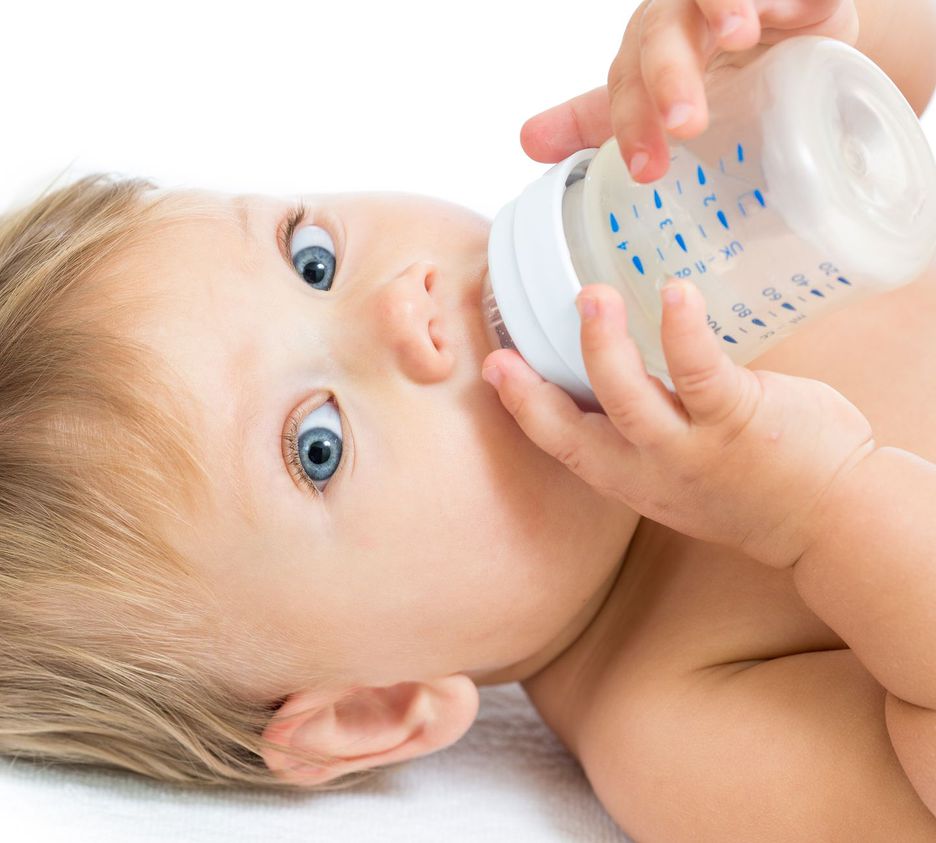

Nutrition
The last stage
The Final Stage in the Introduction of Solid Food to your Baby. From twelve months old, your child will begin to develop the eating habits of an adult and have a balanced diet.

Your baby has had the chance to experiment with different textures and tastes and can now begin to enjoy food in bite-sized chunks and eating purees of a thicker consistency.
In addition. we start to introduce more variety in the diet so as to incorporate all the five food groups in order to obtain all the nutrients necessary for healthy growth and development. Your baby can now enjoy 5 meals a day but remember, do not neglect milk, give at least 500ml daily, because it is an important facet of his diet until, at least, 3 years of age.
Of the five meals, four should be:
- Breakfast: Cereals with Milk.
- Morning Tea: Milk or yogurt or cheese
- Lunch: Purée of vegetable, with meat or fish. Added to this, he should eat rice, potato, pasta or pulses.
- Afternoon Tea: Stewed fruit with milk
- Dinner: Puree of meat or fish and the yolk of an egg, vegetables and cereals in the form of vermicelli, semolina.
- Before going to bed, you can offer a cup of milk so long as this does not exceed his daily requirement.
Of course, in this regime, you can make modifications, where necessary, to adjust to the tastes and preferences of the individual child because you, as parents, know your child best. You and your paediatrician should be able to create a diet within the guidelines we have suggested.
DAIRY PRODUCTS
From 8 months of age, your child can be introduced to dairy products, such as cheese and yogurt. Dairy products provide a rich source of protein and calcium,crucial for bone development and also Vitamin A, Vitamin B and Vitamin D as well as phosphorus. Dairy products are a good source of fats but offer these in moderation. It is desirable to start with light, low fat, low salt cheese.
Yogurts are a healthy option for your baby at this stage. We recommend full cream yogurts with no added sugar content rather than the preparations which target babies. as these often contain added sugar and have a high calorific content.
Yogurt aids the regeneration of your bacterial flora and stimulates the immune system. It gives your baby protection against illnesses and infections. Also yogurts are reasonably low in lactose and are easily digestible.
That said, you should take into account that, from one year of age, experts RECOMMEND THAT COW´S MILK IS NOT SUITABLE for daily intake as it lowers your Iron levels and can produce an excessive amount of proteins. It is also quite low in essential fatty acids, such as Omega.
FISH
This is a good time for white fish, either fresh or frozen. It is rich in protein and omega-3 and is easy to digest because of its soft texture. The best fish to start with is that which has a soft flavor and few bones, such as Hake, Sole, Halibut and Monkfish.
Try to avoid crustaceans or shellfish and, if in doubt, always consult your paediatrician. Fatty fish or Blue fish is also not recommended until 18 months of age. The quantity of fish should be around 20-30g per meal and only 2 - 3 times a week, alternating with red meat and eggs.
It is very important that, if the fish is fresh, we freeze it for 24 hours, before use, in order to avoid Anisakis (nematode worms). The best way to introduce fish into your baby's diet is by shredding it and deboning to prevent choking. Just boil it with vegetables, rice, pasta or pulses and add a tablespoon of olive oil.

EGG
From 11 months of age, you can introduce egg into your baby's diet. It is not recommended before such time as it can produce allergies. It is one of the most allergenic elements and we should be prudent and always follow the advice of your specialist.
Eggs are a rich source of protein with low cholesterol. They contain very little fat, most of which is in the yoke and is healthy fat, like Omega-3.
Eggs also contain certain important minerals such as Iron, Phosphorus, Magnesium and Vitamins A,D,E and those from group B. Eggs do not contain fibre or sugars.
PULSES
A balanced and healthy diet would not be complete without pulses. You can introduce them from 8 months of age, even though dietitians recommend them later on in development (around 10 months). If you have any doubts, consult your doctor.
Pulses are very important and provide sugars, fibre, vegetable proteins, vitamins and minerals. We recommend starting with lentils, peas, green beans and chick peas. If your baby takes these without problems, then you may introduce white beans, broad beans and soy bean.
If your baby starts producing unnecessary gases or suffers from colic, then you may just use pulses without skin; you can buy them in the market today and they will help your baby’s digestion.
 English
English






